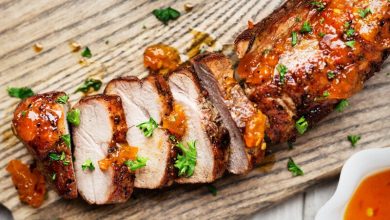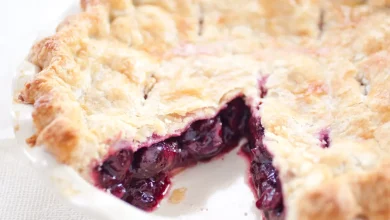Baba Ghannouj, also known as Baba Ghanoush or Baba Gannoujh, is a delicious Middle Eastern dish that is a popular appetizer or dip made primarily from roasted or grilled eggplants. It’s a flavorful and creamy spread that’s perfect for scooping up with pita bread or fresh vegetables. Let’s dive into the details of Baba Ghannouj, complete with emojis as you requested:
🍆 What is Baba Ghannouj?
Baba Ghannouj is a classic Middle Eastern dish that belongs to the family of mezze, which are small dishes typically served as appetizers. The main ingredient is eggplant, and it’s traditionally prepared as a creamy and smoky dip. The dish is known for its rich, earthy flavors and its versatility as an accompaniment to various Middle Eastern meals.
📜 History:
The history of Baba Ghannouj dates back to the Middle East, with origins in the Levant region, which includes modern-day countries like Lebanon, Syria, and Israel. It’s believed to have been a popular dish in these areas for centuries, with recipes and variations passed down through generations.
🥘 Components:
The key components of Baba Ghannouj include:
- Eggplants: The star of the dish, typically roasted or grilled to develop a smoky flavor.
- Tahini: A paste made from sesame seeds that adds a nutty and creamy texture.
- Garlic: Adds a nice kick of flavor.
- Lemon juice: Provides acidity and freshness.
- Olive oil: Used for drizzling and enhancing the richness.
- Seasonings: Common seasonings include salt, cumin, and sometimes paprika or parsley for garnish.
👩🍳 Steps to Prepare Baba Ghannouj:
Here’s a basic recipe for making Baba Ghannouj:
Ingredients:
- 2 medium-sized eggplants
- 2-3 cloves of garlic
- 1/4 cup tahini
- Juice of 1-2 lemons
- Salt, to taste
- Olive oil, for drizzling
- Optional garnish: paprika, parsley
Instructions:
-
Preheat your grill or oven to 400°F (200°C). Roast the eggplants until their skin becomes charred and the flesh is soft, which takes about 30-40 minutes.
-
Once roasted, let the eggplants cool for a few minutes, then peel off the charred skin. This is where the smoky flavor comes from.
-
Mash the eggplant flesh with a fork or blend it in a food processor to achieve a smooth consistency.
-
Add crushed garlic, tahini, lemon juice, and salt to the mashed eggplant. Mix everything together until well combined.
-
Taste the mixture and adjust the seasoning or lemon juice to your preference.
-
Transfer the Baba Ghannouj to a serving dish, drizzle olive oil over the top, and garnish with paprika and chopped parsley if desired.
🕒 Preparation Time:
The preparation time for Baba Ghannouj depends on how you roast the eggplants. On average, it takes about 1 hour, including roasting and preparation. However, the actual time may vary based on your cooking method and experience.
Enjoy your homemade Baba Ghannouj, and don’t forget to serve it with pita bread, cucumber slices, or other fresh veggies for a delightful and emoji-worthy Middle Eastern feast! 🍆🥖🍋🍽️😋
Certainly, here are the nutrition facts and health information for Baba Ghannouj:
Nutrition Facts (Per 1/4 cup serving of traditional Baba Ghannouj):
- Calories: 70-80 calories
- Total Fat: 5-7 grams
- Saturated Fat: 1 gram
- Unsaturated Fat: 4-6 grams
- Cholesterol: 0 milligrams
- Sodium: 90-110 milligrams
- Total Carbohydrates: 6-8 grams
- Dietary Fiber: 3-4 grams
- Sugars: 2-3 grams
- Protein: 2-3 grams
- Vitamins and Minerals:
- Vitamin A: 1-2% of the daily recommended intake
- Vitamin C: 15-20% of the daily recommended intake
- Calcium: 2-3% of the daily recommended intake
- Iron: 3-4% of the daily recommended intake
Health Information:
Baba Ghannouj is a healthy and nutritious dish, primarily due to its key ingredient, eggplant. Here’s some health information about Baba Ghannouj:
-
Low in Calories: Baba Ghannouj is relatively low in calories, making it a good option for those looking to manage their weight.
-
High in Dietary Fiber: Eggplants, the primary ingredient, are a good source of dietary fiber. Dietary fiber is essential for digestive health, and it can help with feelings of fullness.
-
Rich in Antioxidants: Eggplants are rich in antioxidants, such as nasunin and chlorogenic acid, which may help protect cells from damage caused by free radicals.
-
Heart-Healthy: The olive oil used in Baba Ghannouj is a source of heart-healthy monounsaturated fats. These fats can help improve cholesterol levels and reduce the risk of heart disease.
-
Good Source of Vitamins and Minerals: Baba Ghannouj contains essential vitamins and minerals, such as vitamin C, which supports the immune system, and vitamin A, which is important for eye health.
-
Gluten-Free and Vegan: Baba Ghannouj is naturally gluten-free and vegan, making it suitable for those with dietary restrictions.
-
Low in Saturated Fat: The dish is low in saturated fat, which is associated with an increased risk of heart disease.
It’s worth noting that the nutrition values may vary slightly depending on the specific recipe and ingredients used, such as the amount of tahini or olive oil added. However, in general, Baba Ghannouj is a nutritious and healthy option, especially when enjoyed in moderation as part of a balanced diet.




